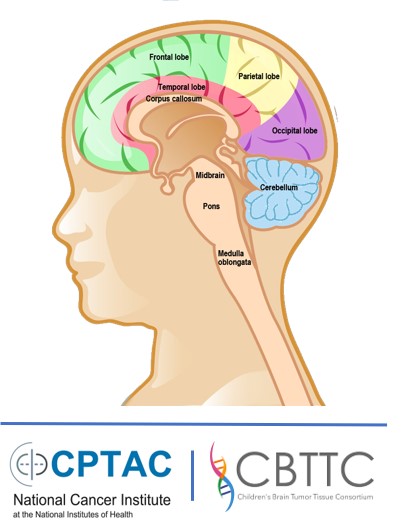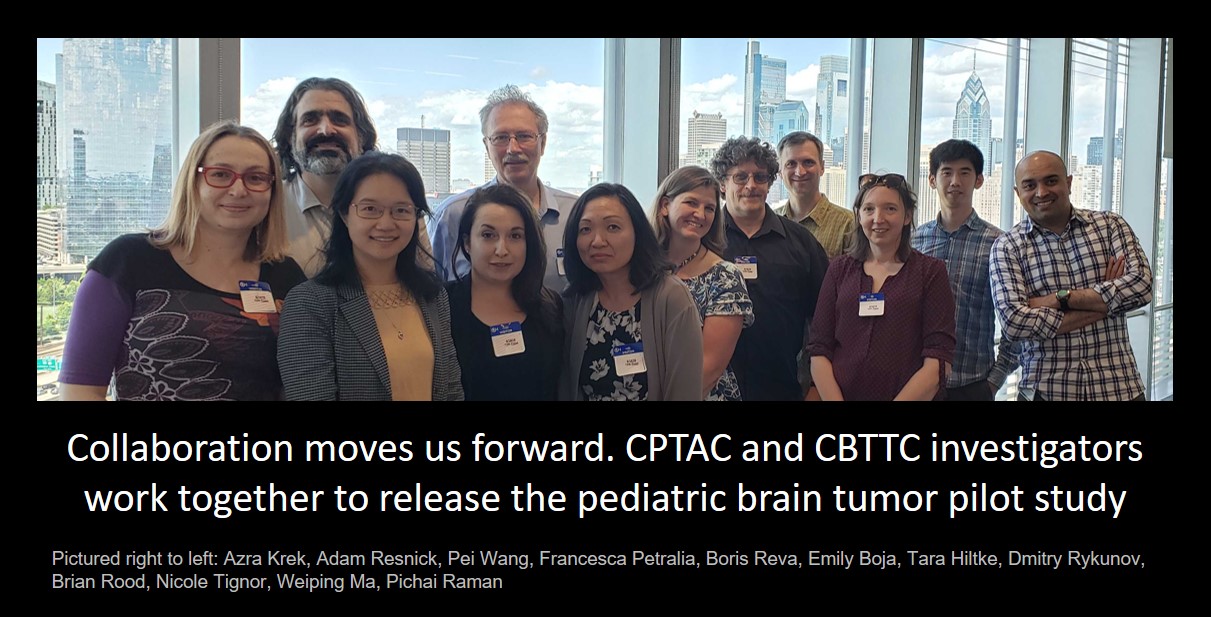While it’s a common misconception that all tumors in the brain are the same, there are more than 120 subtypes of brain cancers with very diverse features and diagnosis. In children, brain tumors are the leading cause of cancer-related death, with many tumor types lacking a standard of care. To date, the main tools used to advance discovery in pediatric brain tumor biology or to distinguish brain tumor types and in turn, define potential targeted therapies to treat them, have focused on examining tumor tissues for genetic mutations and biomarkers. This use of genomics as a diagnostic tool has been moderately successful because our genes only give us a part of our story. Genomic testing allows us to understand a cancer’s ‘input codes’ (genes) that help us distinguish tumor types, but their ‘output codes’ (proteins) are also needed to gain a clearer picture of how to successfully treat them. Proteins are also the true and direct site of action of most drugs. The study of these proteins (proteomics) therefore illuminates an additional layer of biology to the underlying genomics. This is the next frontier of targeted cancer therapies.
the same, there are more than 120 subtypes of brain cancers with very diverse features and diagnosis. In children, brain tumors are the leading cause of cancer-related death, with many tumor types lacking a standard of care. To date, the main tools used to advance discovery in pediatric brain tumor biology or to distinguish brain tumor types and in turn, define potential targeted therapies to treat them, have focused on examining tumor tissues for genetic mutations and biomarkers. This use of genomics as a diagnostic tool has been moderately successful because our genes only give us a part of our story. Genomic testing allows us to understand a cancer’s ‘input codes’ (genes) that help us distinguish tumor types, but their ‘output codes’ (proteins) are also needed to gain a clearer picture of how to successfully treat them. Proteins are also the true and direct site of action of most drugs. The study of these proteins (proteomics) therefore illuminates an additional layer of biology to the underlying genomics. This is the next frontier of targeted cancer therapies.
The Clinical Proteomic Tumor Analysis Consortium (CPTAC), a program within the National Cancer Institute (NCI) and part of the National Institutes of Health (NIH), was created to comprehensively characterize both the genomes and proteomes of many cancer types, also known as cancer proteogenomics. Through collaboration with leaders in the field, CPTAC’s mission is to accelerate precision oncology through state-of-the-art proteogenomics and create open-source community resources. Similarly, the Children’s Brain Tumor Tissue Consortium (CBTTC) is also a collaborative, multi-institutional research program dedicated to the study and treatment of childhood brain tumors. The CBTTC supports the research of new prognostic biomarkers and therapies for children with pediatric brain tumors. Henry Rodriguez, Ph.D., Director of the Office of Cancer Clinical Proteomics Research (NCI) which administrates the CPTAC program, and Adam Resnick, Ph.D., Scientific Co-Chair of CBTTC and principal investigator at Children’s Hospital of Philadelphia along with Dr. Brian Rood M.D., principal investigator from Children’s National Health System, together seized the opportunity to work in partnership on this first-of-its-kind pilot study, making the first steps toward finding targeted therapeutic solutions for pediatric brain tumors using proteogenomics and making that research openly and rapidly available to the public.
Joining forces, CPTAC investigators proteomically profiled more than 200 pediatric tumors across seven different subtypes from samples collected by the CBTTC consortium. Genomic characterization was conducted by CBTTC-based initiatives, with proteomic characterization performed at the Fred Hutchinson Cancer Research Center (CPTAC Proteogenomic Translational Research Center) and Harvard Medical School, followed by data analysis involving CPTAC Proteogenomic Data Analysis Center sites at University of Michigan, Washington University,  New York University and Mount Sinai - Icahn School of Medicine. The coming months will be dedicated to analyzing the data using CPTAC-developed tools to gain insight into the biology of each tumor subtype, including their immune cell characteristics and their kinase/substrate regulations.
New York University and Mount Sinai - Icahn School of Medicine. The coming months will be dedicated to analyzing the data using CPTAC-developed tools to gain insight into the biology of each tumor subtype, including their immune cell characteristics and their kinase/substrate regulations.
As CPTAC is a community resource project, the rich multi-omic datasets produced global proteomics, phosphoproteomics, genomics, RNA-sequencing, pathology and operative reports, and MRI scans which are all now available on NCI’s CPTAC data portal and NIH’s recently launched Gabriella Miller Kids First Data Resource Center.
The driver of this joint study is the commitment to data-sharing and open science. Coming together has given both CPTAC and CBTTC cancer researchers an opportunity to expand their available resources for answering important biological questions. It also promotes the development of new technologies by experts in the field to generate innovative ways to make important steps toward discovery. The pediatric and proteomic communities have used its collective expertise to better understand the mechanisms of pediatric tumors, improve the process of target protein identification and potentially improve cancer treatments. Drs. Rodriguez, Resnick, and Rood are hopeful that upon analysis of these unique samples, new clues can be uncovered that better define the next steps for expanding this pilot effort and advancing the required knowledge for the underlying biology in pediatric brain tumors, bringing new hope to patients.
This ground-breaking research is now available to the public to allow cancer researchers, clinicians and bioinformaticists from all over the world to be involved in finding targeted cancer therapies. Along with this current dataset, the CPTAC program has generated and published proteomic data on a number of cancers that are freely available to the public. These datasets can be found on the CPTAC Data Portal, as well as genomic, clinical and imaging data on the Kids First Data Resource Portal, providing free and open access to researchers throughout the world to this first-in-kind collaborative resource.
Don’t miss the announcement for the much-anticipated study findings by signing-up for email updates here. Follow us on Twitter @NCI_CSSI.

